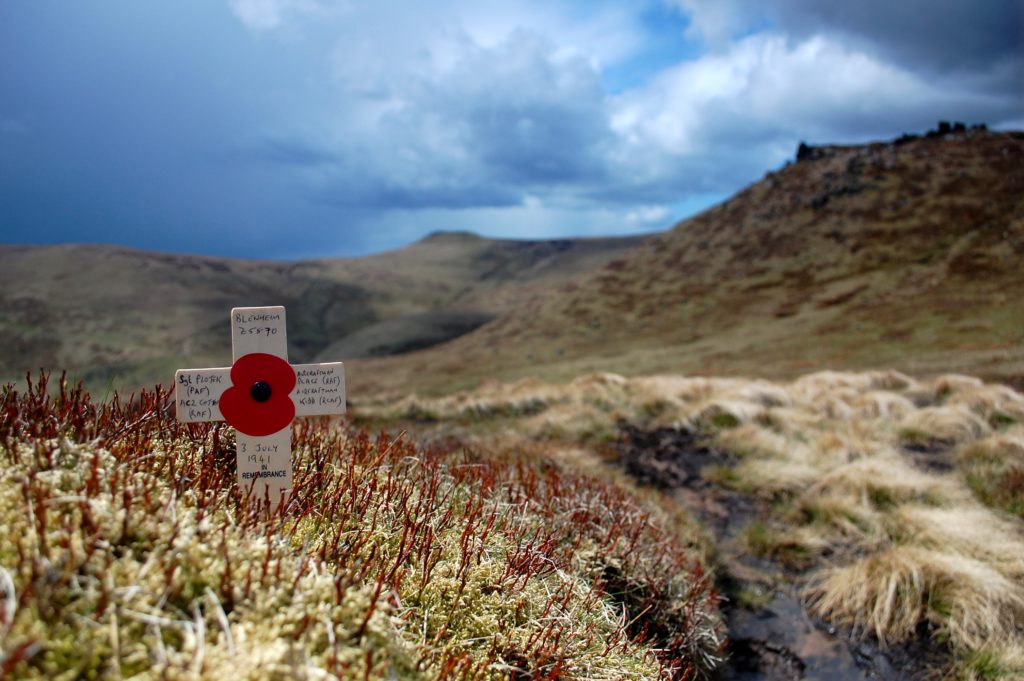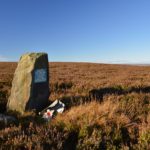Bristol Blenheim MkIV Z5870 on Kinder Scout
‹ Return to RAF Air Crash Sites 1939 – 1942

Blenheim Z5870
Blenheim Z5870
3 July 1941. Blenheim Z5870 was being ferried from RAF Digby in Lincolnshire (where it served with 12 Group Anti-Aircraft Co-operation Flight) to Ringway at Manchester for an overhaul.
Sgt Nikodem Plotek of the Polish Air Force (serving with the RAF) was at the helm with three men, at least 2 of whom were passengers hitching rides back to Manchester for a spell of leave. See below regarding discrepancies in recording the roles and names of those on board.
The Blenheim crashed near Crowden Tower on Kinder Scout in the Peak District, cause unknown. As the aircraft came down on a fairly level bit of moorland it survived mostly intact, but with those on board nonetheless killed; they were found by Royal Artillery Gunner John Hamer who was taking a walk on the moors. Not having been destroyed on impact, the Blenheim could be better examined and so engine failure was ruled out and it was probable that Sgt Plotek had descended blindly through cloud.
Cunningham records the location of the crash site at SK 09437 86747, noting that many have searched for the site previously but with inaccurate details about the location and so without success. The spot is recorded in Cunningham after a hand written note from the family with whom Sgt Plotek was billeted came to light. The note, written 3 days after the crash, identified the location. But as the aircraft did not break up much, Cunningham says a metal detector sweep revealed nothing, any traces having been removed during the recovery and by souvenir hunters afterwards.
There is a terrific comment in Collier from Gunner Hamer, the man who found the wreck who was later posted to guard the downed Blenheim. He said the men on duty amused themselves by firing the turret guns into the air and one night as he was hosing the night sky with threads of tracer bullets he succeeded in rousing the Home Guard in Hayfield and putting the whole district on alert. It didn’t do much for his popularity with the local police, nor his commanding officer.
Crew / Passengers
Sgt Nikodem Plotek (pilot)
AC2 Raymond Place (passenger) Cunningham records his name as Ron Place, this is probably a typo, other sources give the name Raymond.
AC2 Wilfred Cottam (passenger or wireless operator/air gunner). Collier says he was Nikky Plotek’s wireless operator and Cunningham agrees. Another source says he was a passenger.
AC1 William Franklin Kidd (passenger or wireless operator). The same source has AC1 Kidd as wireless op while Cunningham and Collier both say he was a passenger, Collier pointing out the young Canadian was training to be a wireless operator.
RAF Lincolnshire-info has copied the crew and passenger details as recorded in Collier.
Books sourced;
Dark Peak Aircraft Wrecks 1, Ron Collier, 1990
High Peak Air Crash Sites, Pat Cunningham, 2010
13 comments on “Bristol Blenheim MkIV Z5870 on Kinder Scout”
Leave a Reply Cancel reply
Image Information
-
Full Size: 3008×2000px
Aperture: f/5.6
Focal Length: 20mm
ISO: 200
Shutter: 1/800 sec
Camera: NIKON D40


Great work as ever Ian . Nice idea with the monthly link on flickr .it will remind people to look at your blog
Thanks mate. Check out that photo I just sent you.
Great depth of field in that top shot and a well written tale, particlutarly like the quote about the guys – being young men – and playing about with the guns 🙂 .. the sad story of guys being on leave and being killed, well not even a fighting chance and that makes it even more tragic – especially, i can imagine, for their families. great that you have identified your refs [i do the same with my NZ history otherwise i’d forget what i found, where!]
Cheers Ang, trying what I used to do on Flickr.
As you say, it is particularly sad that these guys died in such a random manner – on their way to take leave. There are millions of stories like this so feel pleased to be able to present a handful of them on here.
this is a classy shot Ian . I hadnt takebn in how good it was before !
Hi Paul, thanks for that! Will catch up with you and Al later. Hope all’s well.
I know this is an old post but it’s nice to see my great uncle memorialized
Dad didn’t talk much about his uncle. All i knew was that he died during the war.
Thanks for this site.
An old post but people still reading it. Thank you for dropping by.
Ian
Thanks for the site Ian, very interesting particularly as i always understood my uncle had died in a Dakota accident, as stated already an old post but non the less the link was spotted by my son who passed it on to me. Raymond Place was my uncle, my father’s brother one of seven brothers. My father Ronald Place worked with Raymond and Leslie in a family garage business in Manchester pre war. My uncle Leslie Place served in the Army and was taken prisoner when Singapore fell and was forced to work on the Burma Rail he was one of the lucky ones and survived, he died of old age in 2004 despite his poor treatment at that time. The other brothers, Arthur Place was a miner. Edwin Place served from boy entrant pre war in the Royal Navy and retired as a Lt/Cmd in his mid 50’s. Gilbert Place joined the RAF also as a boy entrant pre war and again retired in his mid 50’s as a Station SWO. My father Ronald like Raymond and Gilbert joined the RAF for war time service. So i guess out of the seven brothers six serving war time to have lost only one of the brothers was probably considered good odds considering what they all went through and did at that time. Just to finish off the war time family connection as there is an aircraft connection my father-in-law John ‘Jack’ Armitage was a Pathfinder Navigator flying Halifax Bomber aircraft on 35 Squadron with 45 trips for his tour, after the war going back to his old ‘job’ as a golf professional. Thank you for the nice touch of the remembrance cross and poppy at the crash site. Raymond is also named on the village remembrance cross at the family village of Frizington in the Lake District where all the brothers were born and brought up before all moving to various parts of the U.K.
Hi John,
Thank you for your visit and comment, I’m pleased you found this website and like the photo.
Thank you too for providing your family’s wartime history. As you say, for 6 of 7 brothers in service, that is something. I always think bomber crews had the worst odds of survival in UK military service during WWII though people would contest that, I’m sure.
Hopefully when these public health restrictions are eased, I’ll be back up on Kinder Scout; it’s been a while.
Hope you are well,
Ian
Thanks for your kind words. I would agree with you on the bomber crew odds farther-in-law did ditch the Halifax in the med 11/11/43 a couple of days in a dingy and washed up on Sardinia, again one of the lucky ones to survive, but his exploits as they say, that’s another story. Enjoy Kinder Scout.
Best wishes, John.
Hi Ian,
Thinking today in remembrance of the 80th anniversary of the fatal crash and the loss of my uncle and his fellow serving R.A.F. colleagues.
Keep well,best wishes, John.
Yes, indeed. Hope you are well John.
Ian